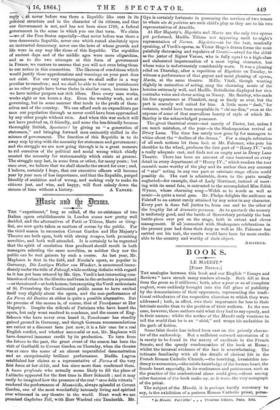uric tn.O .
;
Ma.
THE "experiment," long so called, of the co-existence of two Italian opera establishments in London seems now pretty well decided, and the alternatives of Patti or Titiens, Mario or Ging- lini, are now quite taken as matters of course by the public. For the third season in succession Covent Garden and Her Majesty's Theatre are both open, both with strong troupes, both promising novelties, and both well attended. It is certainly to be regretted that the spirit of emulation thus produced should result in both managers selecting the same novelties, as neither they nor the public can be real gainers by such a course. As last year, Mr. Mapleson is first in the field, and Nicsolai's opera, so popular in Germany, Die Lustigen Weiber von Windser, is announced imme- cliatelyunder the title of Falstaff, while nothing definite with regard to it has yet been uttered by Mr. Gye. Verdi's last interesting com- bination of crime in the libretto and brass in the orchestra is promised —or threatened—at both houses ; butexcepting the Verdi enthusiasts of St. Petersburg the Continental public seems to have excited itself very slightly about the opera, and the non-performance of La Forza del Destino at either is quite a possible alternative. But the promise of the season is, of course, that of Tannl1auser at Her Majesty's. Despite the ridicule of Parisians who have heard the opera, but only went resolved to condemn, and the sneers of Eng- lishmen who have never even heard it, Tannhauser has steadily gained ground in Germany, and though German recommendations are rather at a discount here just now, it is a fair case for a real English verdict, and whether successful or not, Mr. Mapleson will have deserved immense credit by its production. To turn from the future to the past, the great event of the season has been the visit of Garibaldi to Covent Garden on Thursday, when the theatre was at once the scene of an almost unparalleled demonstration and an exceptionably brilliant performance. Madlle. Lagrua established her claims as a representative of Norma of the very first force at her Mgt, and has since more than confirmed them. A basso profondo who actually seems likely to fill the place of Lablache appeared for the first time in Herr Schmidt ; and it may easily be imagined how the presence of the real " eroe della vittoria " rendered the performance of Masaniello, always splendid at Covent Garden, one of the most wonderfully intensely living and spirited ever witnessed in any theatre in the world. Next week we are promised Guglielmo Tell, with Herr Wachtel vice Tamberlik. Mr.
Gye is certainly fortunate in possessing the services of two tenors to whom uts de poitrine are such child's play as they are to his two representatives of Arnoldo.
At Her Majesty's, Rigoletto and Marta are the only two operas yet performed, Madlle. Titiens not appearing until to-night's representation of Norma. Rigoletto—as far the best, musically speaking, of Verdi's operas, as Victor Hugo's drama forms the most painfully distressing and repulsive of libretti—served for the debilt as the jester of Signor Varese, who is fully equal to a high-class and elaborated impersonation of a mast trying character, but whose voice is unfortunately considerably worn. It was a pleasing relief on Thursday, after a repetition of Rigoletto on Tuesday, to witness a performance of that gayest and most pleasing of operas, Marta, at the same theatre. Mdlle. Vitali, though wanting slightly in animation of acting, sang the charming music of the heroine extremely well, and Madlle. Bettelheim displayed her rich contralto voice and clever acting as Nancy. Mr. Santley, who made his first appearance as Plumkett, sang as finely as ever, but the part is scarcely well suited for him. A little more " dash," for instance, would have been acceptable in " chi me dira," even at the expense of some of that marvellous beauty of style of which Mr. Santley is the acknowledged possessor.
The great theatrical event—not merely of Easter, but, unless I am much mistaken, of the year—is the Shakespearian revival at Drury Lane. The time has surely now gone by for managers to whine about the " decline of the drama." For a simple refutation of all such notions let them look at Mr. Falconer, who puts his shoulder to the wheel, produces the first part of " Henry IV." with a really adequate cast, and finds not an empty seat in Drury Lane Theatre. There has been an amount of care bestowed on every detail in every department of " Henry IV.," which renders the tout ensemble more worthy of the play and its author than any amount of " star" acting in any one part or extrinsic stage effects could possibly do. The cast is admirable, down to the parts usually neglected—for example, that of Lady Mortimer, instead of meet- ing with its usual fate, is entrusted to the accomplished Miss Edith Wynne, whose charming song—Welsh as to words as well as music--is quite a vocal gem. Mr. Phelps delights the audience as Falstaff to an extent rarely attained by any actor in any character. Every part is done full justice to, from one end to the other of the lengthy list of dramatis personas. As to spectacle the scenery is uniformly good, and the battle of Shrewsbury probably the best battle-piece ever put on the stage, both in extent and clever management. If all :connected with Shakespeare celebrations in the present year had done their duty as well as Mr. Falconer has carried out his task, the results would have been far more credit- able to the country and worthy of their object.
AMATEUR.






























 Previous page
Previous page